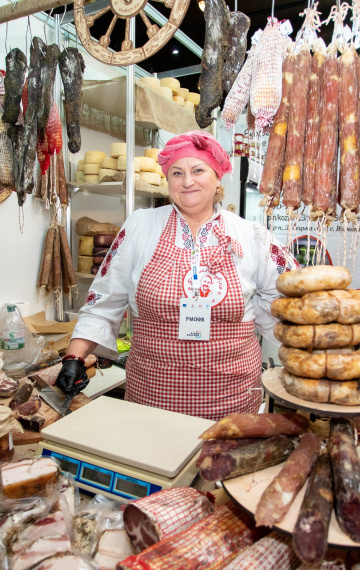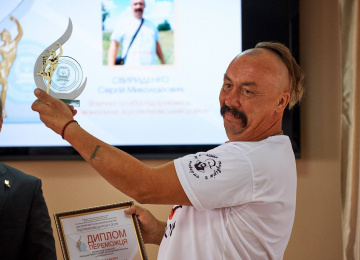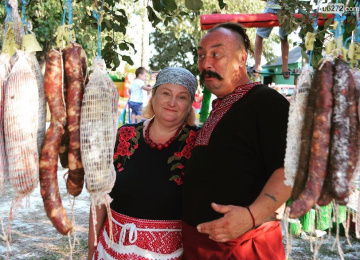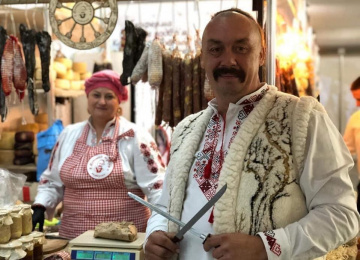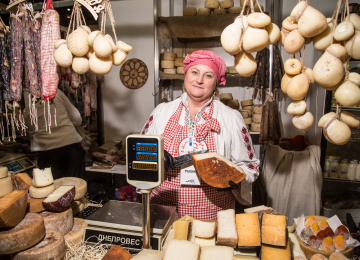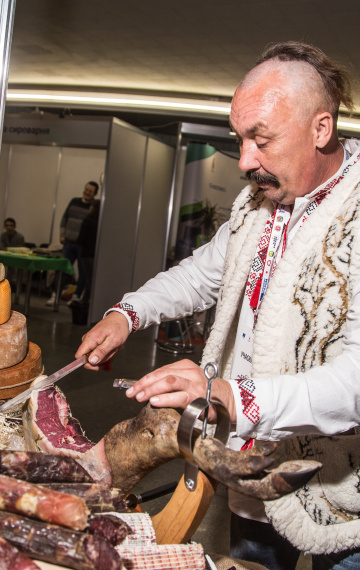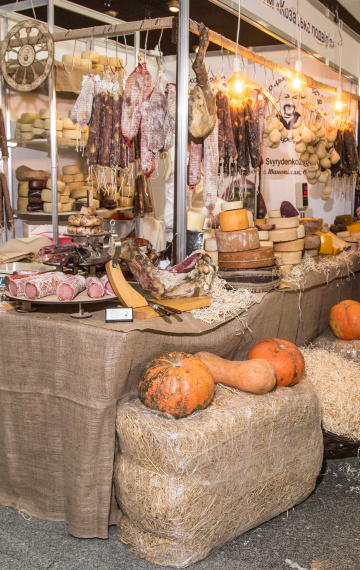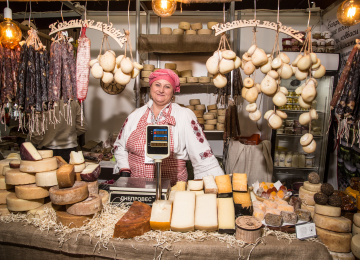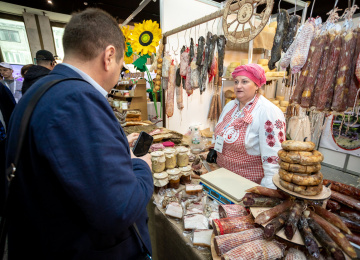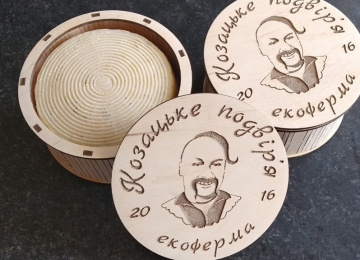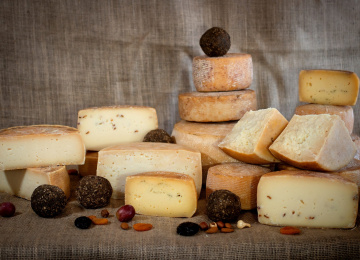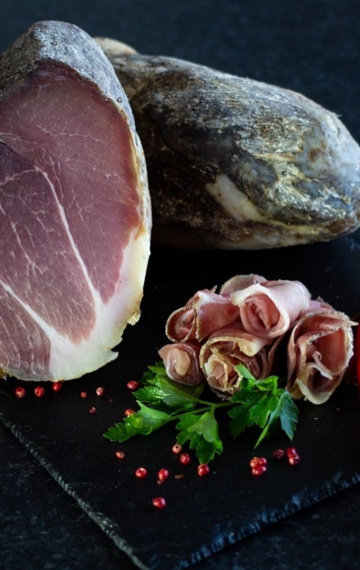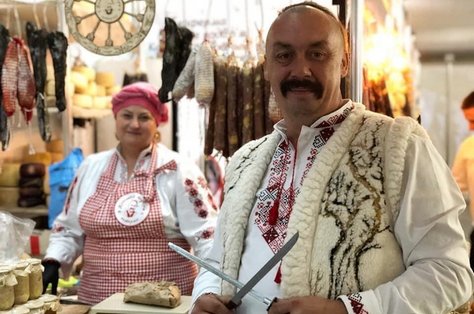
Labneh, haloumi, caciotta with mint, kachokavallo, mahan… These are just some of the exotic names of products made at the Kozatske Podviria or Kozak Yard Farm in Donetsk. When you meet its owner, Serhiy Svyrydenko, with his oseledets or topknot and embroidered shirt, you will be even more surprised, as it’s clear that he embodies a Ukrainian kozak, not a farmer. Indeed, Svyrydenko proves that a kozak can age cheeses according to Italian recipes, dry Spanish ham and make Turkish horsemeat sausage. Last spring, the kozak-farmer received a business expansion grant from UNDP under the EU’s EU4Business Initiative. With it, Svyrydenko was able to build new refrigerated storerooms and increase production.
Business, cooking in Portugal, combat duty, and now farming
When the war came to the Donbas region, Svyrydenko and his wife left their home and a successful business behind, and moved to their summerhouse near Ivanopillia, which is within the 30-kilometer demarcation zone. They expected to sit things out for several weeks and the return, but it soon became clear that the war was not going to end so quickly. So Svyrydenko went to the local enlistment office and asked to be drafted, despite his age, then 40. In early February 2015, he was sent to a training unit near Poltava as a signalman, but Svyrydenko didn’t like this arrangement. He wasn’t prepared to just hang around as a reservist while his wife was supplying food to soldiers at the front. That summer, he was transferred to combat positions.
After being demobilized, Svyrydenko decided to take up farming, as they had a sizeable parcel of land. The family decided to set up an ecological farm and named Kozatske Podviria. Today, they keep free-ranging goats and make cheeses, dry-cured and semi-finished products.
“We were totally city people,” recalls Svyrydenko. “We had sold sausages in Donetsk. And we left everything there including our apartment and book debts. While I was at the front, my family somehow scraped by selling things. Then I was demobilized and had to come up with something to do. I had lived in Portugal for seven years before the war. Among other things, I worked as a cook there. So, we decided to start farming to produce delicatessen, especially since we already knew a lot about marketing."
Exclusive, environmentally friendly production
Kozatske Podviria started with seven goats, some ducks and chickens. Now it houses hundreds of goats, which Svyrydenko knows by name, and a cheese dairy that processes about a tonne of milk every day. Svyrydenko built it in 2017, after he had getting a grant under the Ukrainian Donetsk Kurkul Programme. The farm produces only ecological products as the goats are free-range and fed natural food. Cow’s milk and pork are bought from neighbouring villagers.
“Meat-processing plants compete with each other for the cheapest product,” says Svyrydenko, explaining his business approach. “We don’t work for the mass market, since we can’t do it cheaper. You can’t have high production levels with our small piece of land. We understood that we had to offer something exclusive, not to intersect with anyone and not to squabble over a penny.”
When asked how he and his wife learned to make exotic delicacies, Svyrydenko laughs: everything is available on the internet. “All you have to do is not be lazy.”
In the spring of 2020, Svyrydenko received a grant for business expansion from the UNDP and a Czech organisation called People in Need under the EU4Business Initiative. He spent his UAH 180,000—about €5,000—on a cheese ripening chamber and a refrigerator unit. Svyrydenko says that he needed help, but every investment for him is, first of all, a reason to invest even more of his own money in developing the farm.
“We’re constantly working on a ‘we-have-no-money’ basis, because we’re investing everything in production,” says the farmer. “It’s not about accumulating wealth. Entrepreneurship is just the kind of activity where you can’t stop.”
Next: A new cheese dairy and ecotourism
While talking, Svyrydenko remembers that he has a zoom conference coming up, where he plans to discuss participation in specialized exhibitions. He says he constantly monitors EU opportunities because he plans to transfer his livestock to a new pasture in summer, to breed nutria and rabbits, and eventually to open a new cheese dairy to process two tonnes of milk per day. “And maybe build small cottages for tourists,” he adds.
Visitors regularly come to Kozatske Podviria, because they can watch the goats and ducks for free, which makes city people very happy. Moreover, the Svyrydenkos serve homemade meals and natural wine. Ecotourism is a promising growth area for them, and one of the ways to find new business. For now, they mostly sell online and about one third of their buyers become repeat customers. There are already 1,500 phone numbers in their customer database at the local Nova Poshta office.
In 2018, Svyrydenko won the Entrepreneur of the Year regional competition. However, he seems embarrassed to show this award: for him, the best reward is constant growth, which is made possible, among others, through government and grant programmes.

